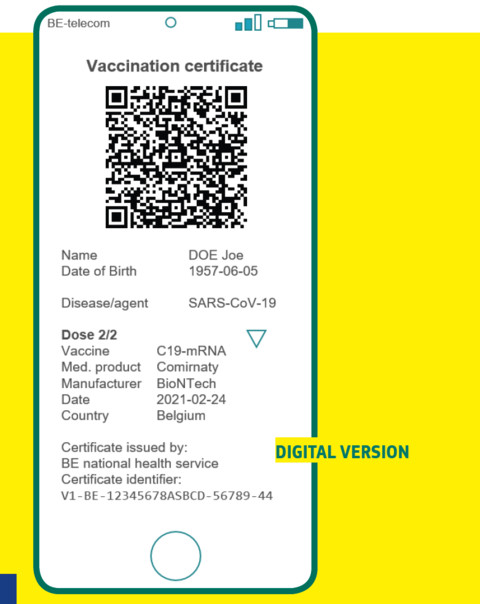[ad_1]
The European Commission unveiled on Wednesday (17 March) its common approach to vaccine certificates to ease free travel within the bloc – amid concerns over the slow and unequal rollout of vaccines across member states.
The announcement comes after tourism-reliant member states, led by Greece, and industry players like the International Air Transport Association, urged the EU to establish a form of vaccination proof ahead of the summer holiday season.
-

The certificates will be free of charge and available in digital form or on paper (Photo: European Commission)
“The certificate will make sure that the results shown are mutually recognised in every member state,” the commission president Ursula von der Leyen said, adding that this digital or paper document will help reinstate freedom of movement in a “safe, responsible and trusted” way.
The EU’s Digital Green Certificate will provide proof of Covid-19 vaccination, recovery or test results (both PCR test or rapid antigen test).
They will be free of charge and available in digital form or on paper, both with a QR code and a digital signature to enable authentication.
Trusted national authorities such as hospitals and test centres will be responsible for issuing these documents. The documents will include the holder’s name, date of birth, the issuing member state, and a unique identifier.
Depending on the certificate, other specific data will be displayed, such as the type of vaccine or test used, the date of vaccination, the test result, or the number of vaccines doses.
And the proof of recovery will have to indicate the date of the positive test result, the issuer and the date of issuance.
This specific document should be issued at the earliest from the 11th day after the first positive test and should be valid for not more than 180 days, the commission said.
Door open for other vaccines
EU countries should issue vaccination certificates for people who have received any of the jabs approved by the European Medicine Agency, but they can decide to accept other vaccines that have only been approved in a specific member state.
So far, BioNtech/Pfizer, Moderna, AstraZeneca, and Johnson&Johnson vaccines are the only jabs approved in the EU.
But Hungary, for example, has also approved the Russian Sputnik vaccine and Chinese Sinopharm jab.
Speaking at a press conference on Wednesday, EU justice commissioner Didier Reynders clarified that the particular use of these certificates will be decided by member states.
However, once a country accepts proof of vaccination to waive certain restrictions such as testing or quarantine, the same rights should apply for those travellers with a vaccination proof issued under the EU system.
Reynders also stressed that these certificates cannot be used as “a pre-condition to free movement” in the EU – a right that has been restricted, limited or prohibited during the coronavirus pandemic.
Certificates for non-EU citizens?
All non-EU citizens, who have the right to travel in the EU or are residing in one member state, will also be eligible to have this green certificate, by providing all necessary information about the vaccination, test or recovery from the illness.
However, member states could object to the issuing of this document to those who have been vaccinated with jabs that have not been approved by the EU regulator.
Currently, non-essential travel to the EU is restricted from third countries, except for a limited number of countries.
Meanwhile, the commission could also accept third-country certificates under the same conditions as Digital Green Certificates in case their systems are interoperable with the EU’s framework and secure enough.
This is considered a medium-term solution until international standards and interoperable systems are in place.
The EU executive also said this is a temporary measure that will be suspended once the World Health Organization declares the end of the pandemic.
Von der Leyen stressed on Wednesday that vaccination rates in Europe are rising, insisting that the EU will reach its goal of vaccinating 70 percent of the adult population by September.
The vaccines certificates will be discussed by EU leaders in the next European summit, later this month. Both MEPs and member states still have to give green light to the proposal.
[ad_2]
Source link